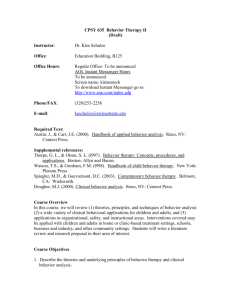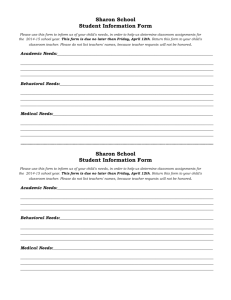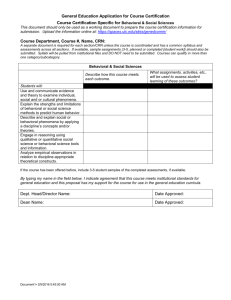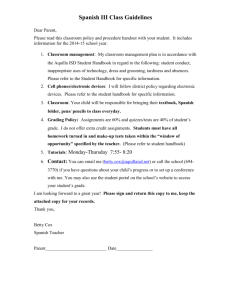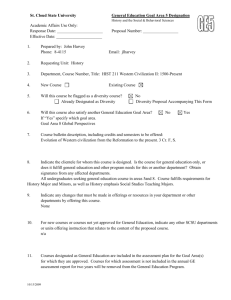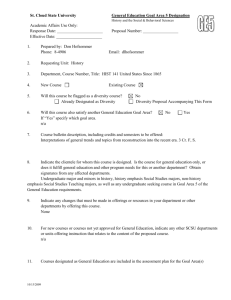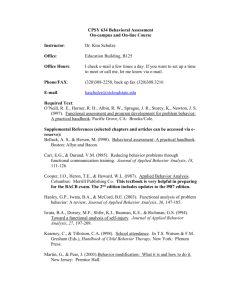CPSY 633 - Association for Behavior Analysis International
advertisement
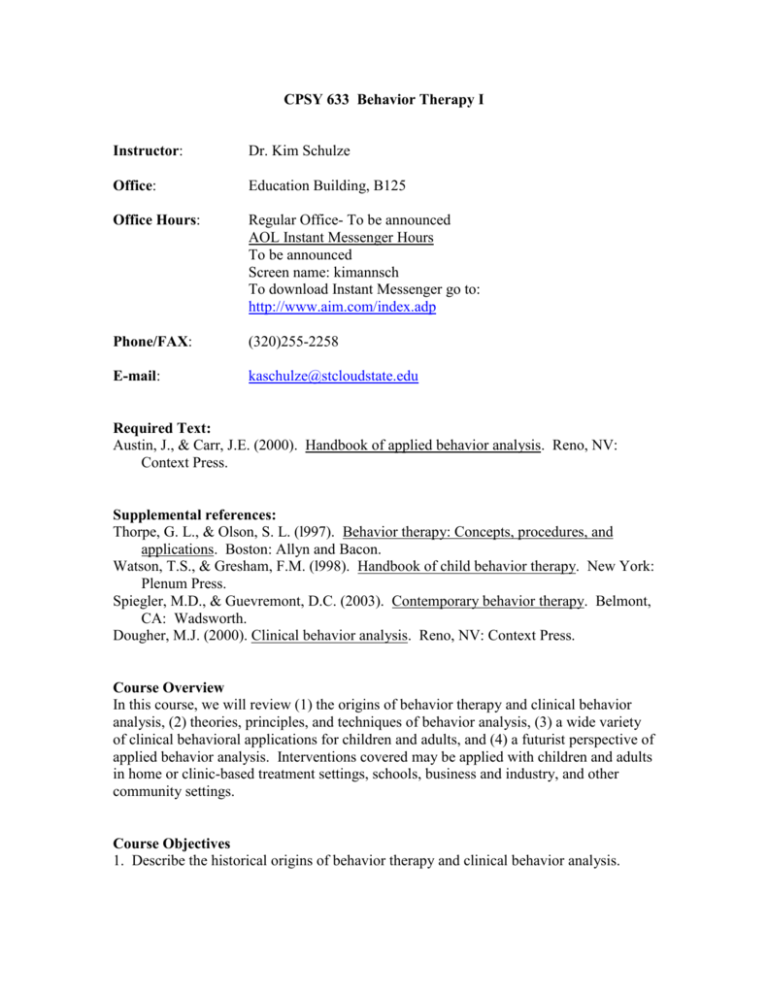
CPSY 633 Behavior Therapy I Instructor: Dr. Kim Schulze Office: Education Building, B125 Office Hours: Regular Office- To be announced AOL Instant Messenger Hours To be announced Screen name: kimannsch To download Instant Messenger go to: http://www.aim.com/index.adp Phone/FAX: (320)255-2258 E-mail: kaschulze@stcloudstate.edu Required Text: Austin, J., & Carr, J.E. (2000). Handbook of applied behavior analysis. Reno, NV: Context Press. Supplemental references: Thorpe, G. L., & Olson, S. L. (l997). Behavior therapy: Concepts, procedures, and applications. Boston: Allyn and Bacon. Watson, T.S., & Gresham, F.M. (l998). Handbook of child behavior therapy. New York: Plenum Press. Spiegler, M.D., & Guevremont, D.C. (2003). Contemporary behavior therapy. Belmont, CA: Wadsworth. Dougher, M.J. (2000). Clinical behavior analysis. Reno, NV: Context Press. Course Overview In this course, we will review (1) the origins of behavior therapy and clinical behavior analysis, (2) theories, principles, and techniques of behavior analysis, (3) a wide variety of clinical behavioral applications for children and adults, and (4) a futurist perspective of applied behavior analysis. Interventions covered may be applied with children and adults in home or clinic-based treatment settings, schools, business and industry, and other community settings. Course Objectives 1. Describe the historical origins of behavior therapy and clinical behavior analysis. 2. Describe the theories and underlying principles of behavior therapy and clinical behavior analysis. 3. Describe and evaluate behavioral assessments and interventions for a variety of clinical areas. 4. Relate applications to ethical codes and standards for behavior analysts. 5. Discuss current and future trends in behavior analysis and the role of behavior analysts in society. Student Requirements: You will participate in a variety of activities designed to increase your knowledge and skills in behavior analysis. Requirements include the following: 1. Tests: Tests are scheduled to be taken every other week and are proctored. Tests will be short essay and cover all instructional material provided by the instructor. The tests are not open book tests. 2. Pretest and PostTest The pretest should be taken during the first week of class before beginning the reading assignments. The post test should be taken at the end of the course and covers all course material. The tests will be short essay. They are not open book tests. 3. Study guide questions. To help you prepare for tests, you will write responses to study guide questions for course material. You will discuss study guide responses with your discussion group to help in understanding the material. A copy of your study guide responses must be turned in with each test and returned to the instructor along with the test. 4. Discussion. Each student will be assigned to a discussion group. Students will rotate discussion leader duties with the leader responsible for posting a discussion question and providing follow up questions to keep the threaded discussion going. Students will post at least two “quality” comments to the threaded discussion each week. The student discussion leader will start the discussion by posting a question on Wednesday. Students will have until the next Tuesday at midnight to post comments. A discussion grade based on quantity and quality will be given at mid-term and at the end of the term. 5. Gather research articles for literature review for Behavior Therapy II. The major assignment for BT II is to write a literature review and research proposal in an area of interest. Read syllabus for Behavior Therapy II. Since you all now know how long interlibrary loan takes and how time-consuming it is to track down articles, it is highly recommended that you gather research articles over the summer. Grading will be based on: 4 Tests and Post Test (40 pts each) Pretest (10 pts) Study guide answers (10 pts each) Discussion (20 pts midterm, end of semester) Total 210 points 40 40 290 Course grades: A = 90% of points B = 80% of points C = 70% of points D = 60% of points IMPORTANT!! New policy on late tests and assignments If the test or assignment is turned in one week late, 10% will be deducted from your grade. If the test or assignment is turned in two weeks late, 25% will be deducted from your grade. The test or assignment will not be accepted if more than two weeks late. All course assignments are due by July 31 – NO EXCEPTIONS. I will not be available in August. Deadlines for tests and assignments are marked below and in the WebCT calendar. You can complete the tests and assignments earlier but not later. If you have vacations, wedding, etc. planned for the summer, you will need to complete assignments earlier, not later. The course is structured this way to prevent anyone from cramming course requirements into the week before the end of the semester. It takes time to thoroughly understand and synthesize material. In order to truly do justice to the material, it’s important to work at a steady pace. In order for me to give timely and relevant feedback that improves your learning, tests and assignments need to be turned in on time. Thus, I’m arranging contingencies to ensure that you keep up. As you review the course schedule, mark due-dates on your calendar and create a study schedule for yourself. Treat your online course as if you were required to attend class in person - set aside a specified time each day where you will study and complete the readings. If possible, form study groups with cohort members and meet regularly. Do not deviate from this schedule, it will help you stay on track. Build in frequent reinforcers for yourself and your study group for staying on track! Course Schedule: Course begins May 19 and ends July 31 Assignment Due date Pretest May 29 Test 1 on Weeks 1, 2 June 4 Test 2 on Week 4 June 19 Test 3 on Week 6 July 3 Test 4 on Week 8 Post Test July 17 July 31 Week 1 – Review syllabus Pretest Week 2 Electronic Reserve: Antecedents of contemporary behavior therapy Handbook of Applied Behavior Analysis Forward by Beth Sulzer-Azaroff Ch. 20 - A futurist perspective for applied behavior analysis Week 3 Test 1 Week 4 Handbook of Applied Behavior Analysis Ch. 3 The functional analysis model of behavioral assessment Ch. 11 Behavioral interventions for children with autism JABA (on-line) Using the picture exchange communication system (PECS) with children with autism Week 5 Test 2 Week 6 Electronic Reserve: Brief/graduated exposure therapy Prolonged/intense exposure therapy Behavioral relaxation training Week 7 Test 3 Week 8 Handbook of Applied Behavior Analysis Ch. 6 Assessment and treatment of habit disorders Ch. 7 Behavioral pediatrics: The confluence of applied behavior analysis and pediatric medicine Electronic Reserve: A behavioral analytic approach for treating depression Week 9 Test 4 Week 10 Handbook of Applied Behavior Analysis Ch. 9 Behavioral contributions to brain-injury rehabilitation Ch. 17 Behavioral sport psychology Week 11 Post test Course Evaluations
